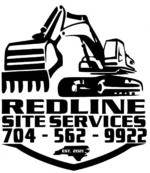Land clearing in Marshville requires careful planning to protect water tables from contamination. Contaminated groundwater risks public health, ecosystem damage, and legal penalties. This guide explains proven methods to safeguard water tables while clearing land for development.
What Are Water Tables and Why Protect Them?
A water table is the underground boundary where soil becomes saturated with water. In Marshville, these layers supply drinking water to 85% of rural households. Pollution from land clearing can seep into groundwater, making it unsafe.
Key risks of poor practices:
- Chemical runoff from fuel or pesticides.
- Sediment clogging natural filtration systems.
- Pathogen spread from animal waste or sewage.
Call (704) 562-9922 for land clearing & erosion control tailored to Marshville’s environment.
Steps to Prevent Water Table Contamination
1. Conduct a Pre-Clearing Site Assessment
Evaluate the land’s natural drainage patterns and proximity to wells or streams. In Marshville, the NC Department of Environmental Quality (DEQ) requires assessments for projects within 500 feet of a water body.
Tools to use:
- Soil permeability tests (cost: 200–200–500).
- Drone surveys to map slopes and runoff paths.
2. Use Erosion Control Barriers
Install silt fences, straw wattles, or geotextiles to trap sediment. According to the EPA, these barriers reduce sediment runoff by 60–90%.
Best practices:
- Place barriers 10–15 feet apart on slopes.
- Inspect weekly during rainy seasons.
Grading services can level terrain to minimize erosion risks.
3. Avoid Clearing Near Sensitive Areas
Marshville’s Catawba River Basin has strict rules for land within 100 feet of streams. Clearing here requires a Buffer Zone Permit from the DEQ.
Alternatives:
- Build around protected zones.
- Use directional felling to keep trees away from waterways.
4. Properly Dispose of Debris
Burning or burying waste can leak toxins into groundwater. The Marshville Municipal Code mandates recycling or hauling debris to licensed landfills.
Cost-effective solutions:
- Recycle concrete and metal (saves 50–50–100 per ton).
- Hire demolition services for hazardous material removal.
Common Mistakes That Harm Water Tables
1. Over-Clearing Vegetation
Removing too many plants destabilizes soil, increasing runoff. Marsville’s clay soil loses 2–5 inches of topsoil annually without ground cover.
Fix: Leave native shrubs and grasses in drainage areas.
2. Using Heavy Machinery Near Wells
Machinery leaks fuel or oil, which can seep into groundwater. The EPA reports that 1 gallon of oil contaminates 1 million gallons of water.
Prevention:
- Mark well locations with GPS.
- Use biodegradable hydraulic fluids.
3. Ignoring Spill Protocols
Fuel or chemical spills must be contained immediately. Marshville fines violations up to $25,000 per incident
Response kit essentials:
- Absorbent pads and booms.
- Non-toxic degreasers.
4. Improper Disposal of Household Chemicals
Many homeowners unknowingly harm water tables by improperly disposing of household chemicals like pesticides, paints, and cleaning agents. These substances seep into the soil and contaminate groundwater.
The US Geological Survey (USGS) estimates that 70% of private wells show traces of household contaminants due to improper disposal practices.
Solution:
- Dispose of chemicals at designated hazardous waste facilities.
- Use eco-friendly alternatives for cleaning and pest control.
Erosion Control Methods and Effectiveness
| Method | Cost per Acre | Sediment Reduction | Best For |
|---|---|---|---|
| Silt Fences | $200–$400 | 60–70% | Slopes under 10% |
| Hydroseeding | $1,000–$2,500 | 80–90% | Large, exposed areas |
| Retention Ponds | $3,000–$8,000 | 95%+ | Sites near water bodies |
Septic tank services prevent wastewater leaks during projects with temporary facilities.
FAQs About Water Table Protection
Q: How deep are Marshville’s water tables?
A: Depths range from 10–50 feet, depending on the area (USGS).
Q: Can I clear land during the rainy season?
A: Avoid it. Spring rains increase erosion risks by 40% (NOAA).
Q: Do I need a permit for small-scale clearing?
A: Projects under 1 acre may qualify for a General Permit if buffers are maintained.
Call Today
Protect Marshville’s water tables with expert planning and professional solutions. Improper land clearing can lead to costly environmental damage and regulatory fines. Our team specializes in compliant, sustainable practices that protect your property and local water sources. From soil stabilization to spill prevention, Redline Site Services delivers tailored strategies for long-term success. Call us at (704) 562-9922 today for trusted land clearing & erosion control services designed to meet Marshville’s unique needs.
Sources:
